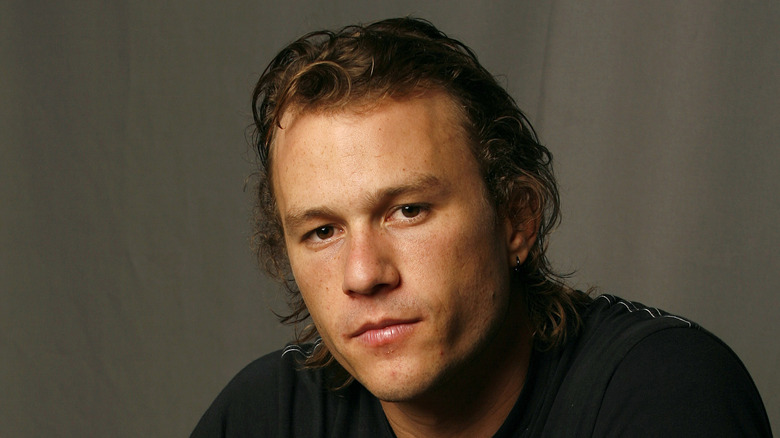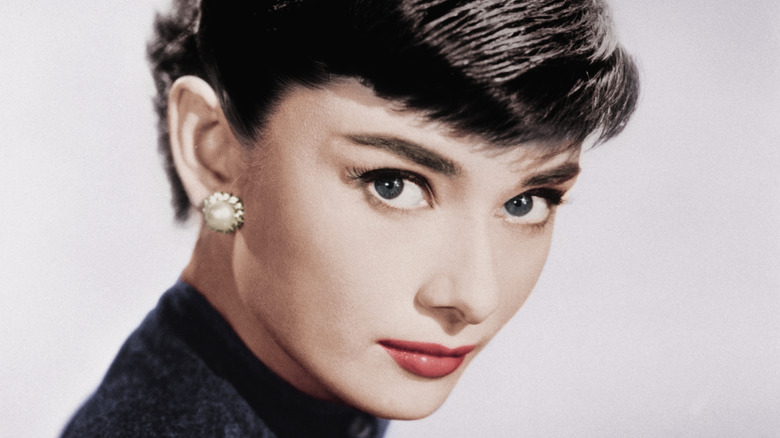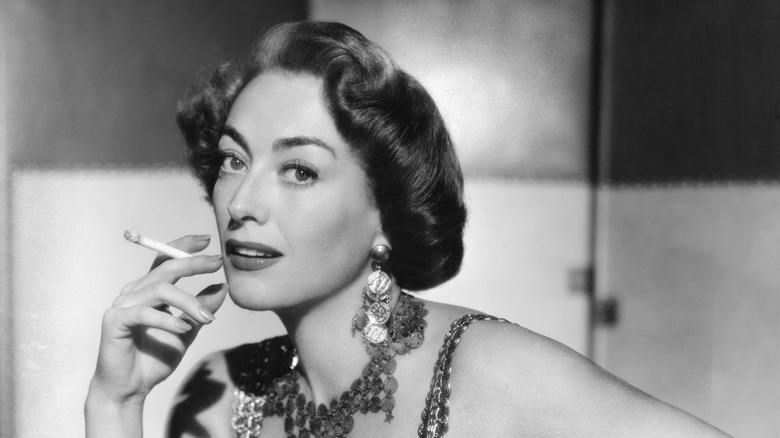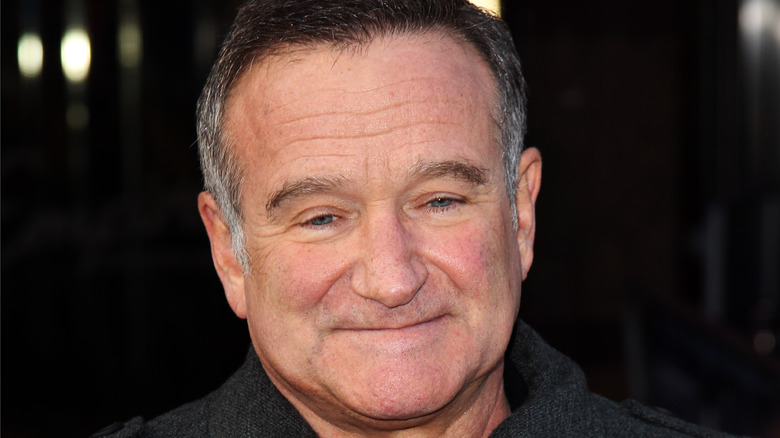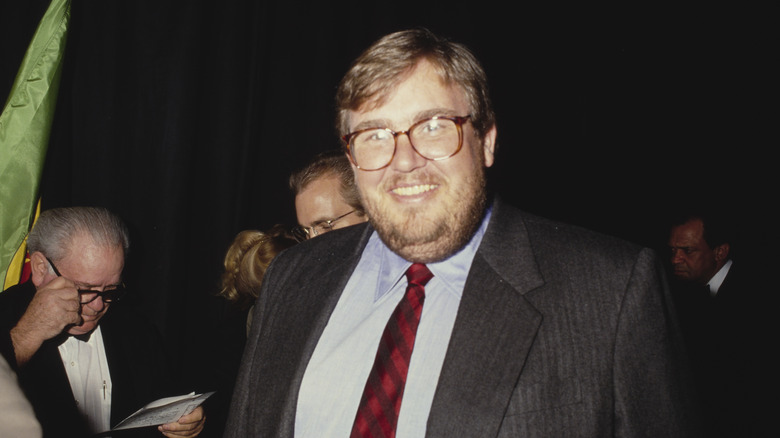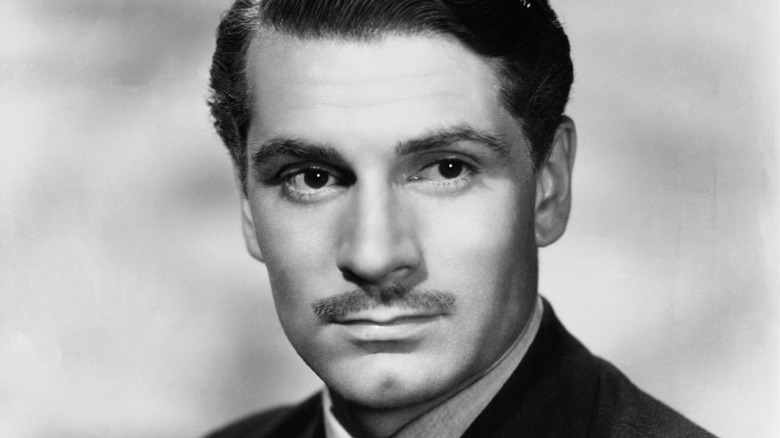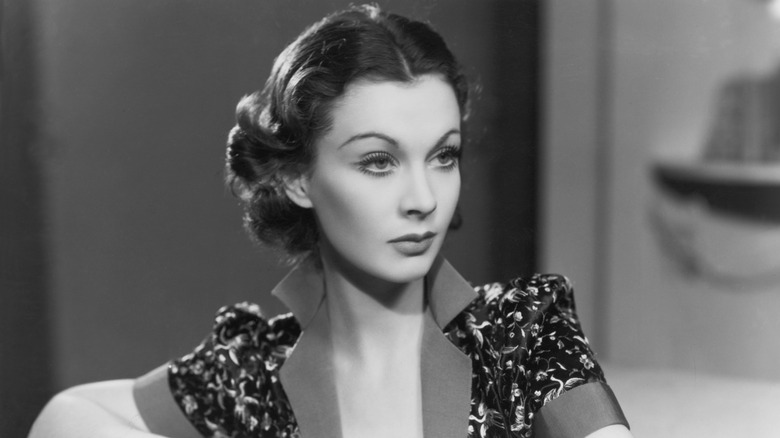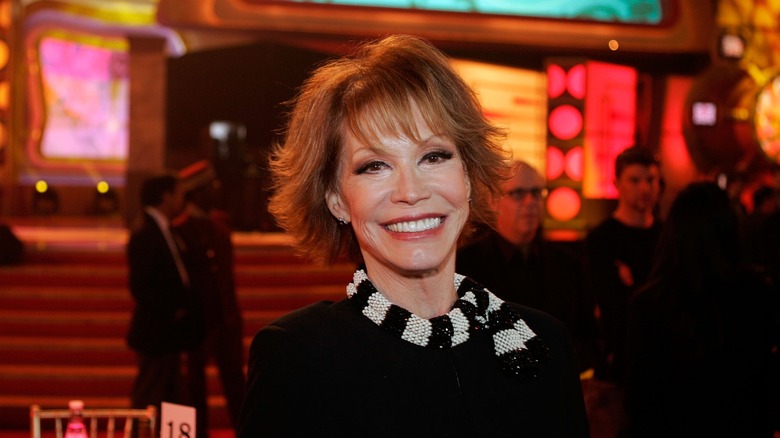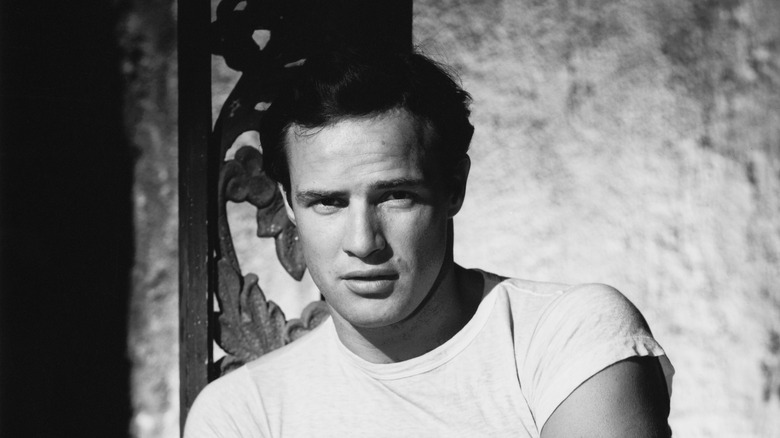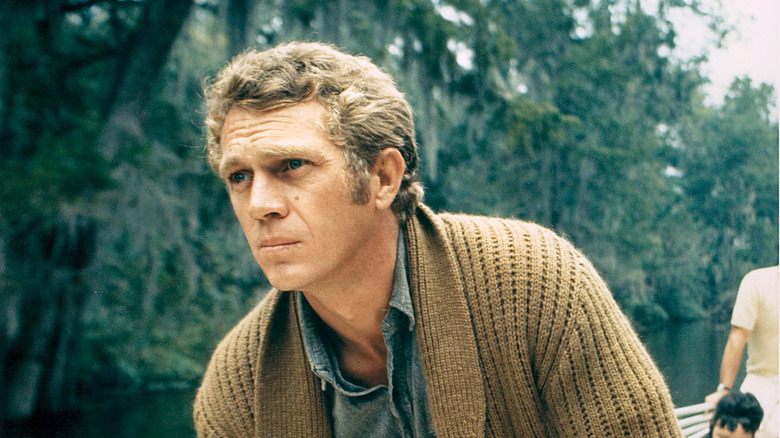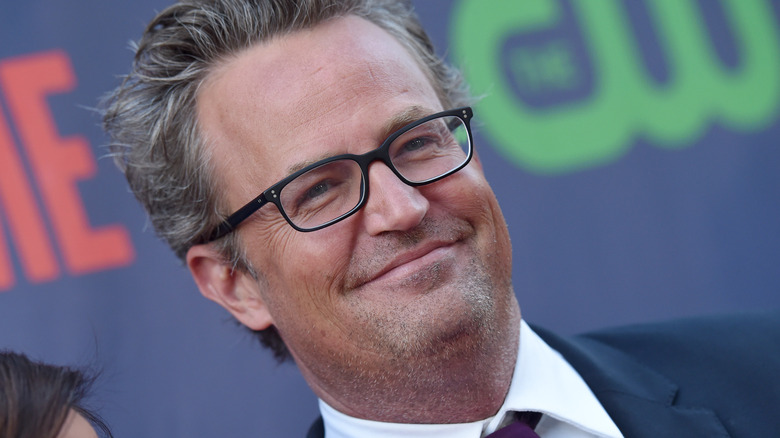Things We Learned About Actors After They Died
In the age of social media and big budget promotional tours in support of every studio-backed TV show or movie, it can feel as though we have incredible insights into the private lives of actors, more so than audiences have ever had before. While actors are paid to take on the lives of other people for a living, for their fans they are also characters in themselves, real-life heroes with rich inner lives that are sometimes shared so openly that it's easy to feel we know them as well as friends and family members.
But the truth is that even as stars vie for our attention, clicks, and box office receipts, the face they show to the world is often thoughtfully airbrushed, with actors typically supported by a crack team of managers, agents, assistants, and publicists who help them curate their image to ensure the greatest mass appeal. This has been the case since the early days of Hollywood, and indeed, many of the most surprising facts about the industry's leading actors only came to light in hindsight, through the insights of friends, colleagues, and biographers after the star in question had died. Here are some of the most surprising and intriguing facts about our favorite actors that only emerged posthumously.
Audrey Hepburn helped the Dutch resistance
By the time of Audrey Hepburn's death in 1993 at the age of 63, the movie icon had proven herself to be a figure of note both on and off camera. Beginning her career as a dancer and model, Hepburn eventually worked her way to the peak of the entertainment industry, starring in classic movies including "Breakfast at Tiffany's" and "Funny Face," as well as various TV and stage roles. After "Audrey Hepburn's Enchanted Tales" won the best spoken word album for children Grammy in 1994, she became one of just 19 people to have won an Emmy, Grammy, Oscar, and Tony (known in combination as an EGOT). In her later years, Hepburn became a prominent activist as a goodwill ambassador for UNICEF.
Few of her fans knew, however, that even in Hepburn's early days she was adept at using her talents for the greater good. The future star spent many of her formative years in the Netherlands, and during World War II Hepburn supported the Dutch resistance against German occupation. A notable dancing talent during her teenage years, Hepburn performed at "black evenings," shows banned by the Nazis which aimed to raise money for refugees fleeing the regime. She also helped in assisting Allied bomber pilots whose aircraft were brought down in the Netherlands, passing on information, phrasebooks, and money to help pilots avoid capture. Hepburn had alluded to these activities during her lifetime, but it was only after her death that researchers were able to verify claims she had made in passing.
Joan Crawford's bad parenting
Joan Crawford was once remembered as one of the most glamorous and magnetic figures of the Golden Age of Hollywood. The actress dominated the box office during the 1930s and 1940s, with a string of major hit movies including the 1945 classic "Mildred Pierce," which won her an Oscar. Though her career understandably slowed as the years passed, her reputation was kept alive in the second half of the 20th century thanks to her starring role alongside Bette Davis in the disturbing sibling feud drama "What Ever Happened to Baby Jane?" and her 1971 memoir "My Way of Life."
She died in 1977, but within a year her legacy as an actress was overshadowed by new revelations about her private life as the mother of four adopted children. In 1978, her daughter Christina published her own memoir, "Mommie Dearest," which alleged that her childhood had been marred by abuse at the hands of the Hollywood icon. Though Christina's account of her childhood has been challenged by Crawford's other children, a movie adaptation starring Faye Dunaway came out in 1981, followed by further books, ensuring that scrutiny of Crawford's parenting continued long after her death. "My mother should have been in jail," Christina told The Guardian in 2019.
Heath Ledger's Joker diary
Heath Ledger died tragically in 2008, of an accidental prescription drug overdose, aged just 28. By then, the Australian actor had established himself as a bankable romantic lead in classics of the era such as "10 Things I Hate About You" and "A Knight's Tale," and became one of the most talked-about actors of his generation after starring opposite Jake Gyllenhaal in the boundary-pushing gay Western "Brokeback Mountain" in 2005.
But Ledger's defining role was a posthumous one. In 2008, moviegoers were treated to a new Batman movie, "The Dark Knight," featuring Ledger as the Joker. Though Empire magazine had first teased Ledger's twisted portrayal — which saw him take on the classic DC character with smeared makeup, facial scars, and greasy hair — in 2007, few could have expected Ledger to take the Joker to the nihilistic depths he went to on screen. "He's just an absolute sociopath, a cold-blooded, mass-murdering clown, and [director Christopher Nolan] has given me free rein. Which is fun, because there are no real boundaries to what the Joker would say or do. Nothing intimidates him, and everything is a big joke," he told Empire.
Ledger mentioned that he had locked himself in a London hotel room and journaled to get into the character's headspace. It was only after his death that glimpses of the diary in question came to light and showed quite how intensely Ledger had obsessed over his role, with drawings and scrawled writing that looked as though they were created by the Joker himself.
Robin Williams' undiagnosed dementia
The 2014 death by suicide of Robin Williams was met by a wave of heartbreak from his colleagues and fans, many of whom knew him from his classic stand-up routines, TV shows, and movies going back to the 1970s. Much of his work was family-friendly fare, such as "Mrs. Doubtfire" and "Flubber," which made him a favorite among children to whom he appeared something like a fun uncle.
But away from the cameras, Williams had long been open about the depression that plagued him throughout his life, as well as his alcoholism and drug addiction which exerted a toll on his private life. He was forthcoming with such revelations in interviews, details of which seemed so at odds with his hyper-energetic and upbeat stage persona.
But while critics argued that characterizing Williams' tragic story as that of the stereotypical "sad clown" was overly simplistic, the truth, according to his widow, Susan, was that it wasn't depression in the clinical sense that underpinned Williams' death at all. Robin Williams' autopsy revealed the disturbing truth: that the comedian was suffering from a brain disease called Lewy body dementia, a rare condition that causes violent mood swings and was the most likely cause of his death (via The Guardian).
John Candy turned down SNL for the sake of his family
For nearly half a century, "Saturday Night Live" has created generation after generation of American comedic superstars. Launched in 1975 under the stewardship of Dick Ebersol and Lorne Michaels — who still runs the show today — iconic comedy actors including Bill Murray, Adam Sandler, Tina Fey, and Eddie Murphy have been part of the show's core cast at one time or another, and it continues to attract future stars today.
According to Doug Hill and Jeff Weingrad's "Saturday Night: A Backstage History of 'Saturday Night Live,'" back in 1981 Ebersol and Michaels were keen to attract one painfully funny up-and-coming talent: John Candy. Candy was in the ascendancy at the time, starring in the Canadian sketch show "SCTV" alongside Martin Short and Eugene Levy, and starting to gain his first movie roles. "SNL" would undoubtedly have given his career yet another major boost, but Candy turned it down, with the book claiming that he was unhappy at being caught between the two shows.
However, more recently it has been claimed that Candy turned down the chance to be an "SNL" regular for another reason: the sake of his family. Famously, back in its heyday "Saturday Night Live" was a hotbed of hedonism thanks to the party lifestyles of its leading talents. Speaking to "Today" on the 30th anniversary of Candy's sudden death at the age of 43, the actor's daughter, Jennifer, described her father as "the ultimate family guy," and claimed: "That's the reason he didn't want to do 'Saturday Night Live.' He knew the lifestyle wasn't going to be healthy for him. He was smart in that way."
Laurence Olivier got stage fright
Laurence Olivier was a legend of both stage and screen. The English actor first made his name on London's West End in the late 1920s before breaking into Broadway, establishing himself as one of the finest stage actors of his generation. Arguably his greatest achievement came in 1937, the year of his legendary "Hamlet," which was shortly followed by his starring role as Heathcliff in the Hollywood film adaptation of Emily Brontë's "Wuthering Heights" in 1939. By the time he starred in 1940's "Rebecca," directed by Alfred Hitchcock, he was a household name.
In his prime, Olivier was known for his dashing good looks and simmering charisma. But as fans found out later, even actors as legendary as him can face the occasional crisis of confidence. In 1971, Olivier starred in Eugene O'Neill's "Long Day's Journey into Night" at the British National theater. The role was enormous and demanding, and Olivier, who was in his mid-60s, had just overcome two periods of ill health. Nevertheless, he took on the project, and throughout the rehearsal period brought to it the keen professionalism that ultimately made it one of the great successes of his later career.
However, according to the play's director, Michael Blakemore, the aging Olivier had difficulty remembering his lines, which worried him as they entered the technical dress rehearsal (via The Guardian). "That's funny, I've got stage fright," he admitted to Blakemore prior to the performance. The opening night began anxiously, but even as Olivier forgot a line toward the conclusion of the play, it was rapturously received by audiences.
Vivien Leigh's bipolar disorder
Laurence Olivier courted some controversy in his life after it was revealed that he had been having an affair with the actress Vivien Leigh, with whom he co-starred in several films and plays. Both actors were already married to other people when they began their liaison, though the pair tied the knot themselves in 1940, a year after she starred as Scarlett O'Hara in "Gone with the Wind." The film is considered a classic, made Leigh a movie icon, and gained her an Academy Award.
In the years that followed, Leigh continued to attract major roles, starring in "Caesar and Cleopatra" in 1946 and "A Streetcar Named Desire" in 1951, among numerous others. However, Leigh also gained a reputation for being difficult to work with, which experts now agree was a gross mischaracterization of the actress, who was privately dealing with mental health issues that were little understood during her lifetime.
Biographers now agree that Leigh had bipolar disorder, which affected both her work and her relationships. She was frequently hospitalized, and treated with electroshock therapy, a tragic aspect of her private life which was largely hidden from the public.
Chadwick Boseman's 2016 cancer diagnosis
Chadwick Boseman was a heroic actor whose career had just hit its commercial peak at the time of his tragic death from colon cancer in 2020, at the age of 43. In 2018, he starred in Marvel's "Black Panther," a box office smash that took in more than $1.35 billion worldwide, a movie which made him a megastar and earned him legions of fans.
But neither fans nor the majority of his colleagues were aware that at the same time as working on major Hollywood films, Boseman was receiving cancer treatment. By the time of his death, Boseman had been aware of his condition for four years, during which time he produced some of his greatest work, such as his portrayal of Levee in "Ma Rainey's Black Bottom," which was released the year of his death and for which he was posthumously nominated for an Academy Award. He was due to star in the sequel to "Black Panther" in 2022.
Mary Tyler Moore's poor vision
"The Dick Van Dyke Show" was a huge ratings smash in the 1960s, and made a star of Mary Tyler Moore, the up-and-coming comedy actress who portrayed Van Dyke's on-screen wife, Laura. The show ran for five years, making Moore a household name and leading to her own "The Mary Tyler Moore Show," which was a huge hit a decade later.
Moore was admired for her startling good looks, her beaming smile, and her immaculate comic timing. She remained a popular figure throughout her life before her death in 2017 at the age of 80. But what she kept secret throughout the decades of her fame was that she had suffered dramatic deterioration to her vision as early as the 1980s, a symptom of type 1 diabetes, and was close to sightless for the second half of her life. Moore's husband, Dr. Robert Levine, confirmed to Page Six that the actress had hidden her condition from the public up until her death. Levine later founded the Mary Tyler Moore Vision Initiative in her memory.
Marlon Brando and Richard Pryor's affair
The legendary actor Marlon Brando was surprisingly open about his sexuality during the height of his fame, making reference to homosexual experiences and pretty much confirming that he was bisexual at a time when homophobia was rife. However, it was only in 2018, 14 years after Brando's death, that the world learned that he had at one time slept with another of the era's leading men: the comedian Richard Pryor.
The surprising liaison came to light through a Vulture interview with producer-musician Quincy Jones, who claimed that Brando would "f*** anything. Anything! He'd f*** a mailbox. James Baldwin. Richard Pryor. Marvin Gaye." The interview quickly went viral, with fans and online gossipers alike searching for confirmation that Jones' unexpected and unverified claim was in any way true. Though Pryor's daughter initially rubbished the claim, the affair was later confirmed by Pryor's widow, Jennifer, who said that the comedian wrote about his fling with Brando in his diaries.
Steve McQueen's spiritual awakening
Steve McQueen was just 50 years old when he died of a heart attack, which occurred hours after he underwent major surgery in a hospital in Mexico to remove a cancerous tumor in his lungs. He had been diagnosed with mesothelioma, which had spread through his body and which was widely considered to be incurable. The treatment McQueen had sought was controversial, with the doctor who oversaw the regimen having previously been barred from practicing medicine in Texas.
The surgery came a year after the actor's diagnosis at the end of 1979. By then, McQueen had become a born-again Christian, embracing the faith six months before finding out he had terminal cancer. He later became a devotee of the evangelist preacher Billy Graham, who gave McQueen his own Bible to pray with. "Before cancer, McQueen's outlook on life was very cynical," the actor's biographer Marshall Terrill told Fox News. "I think Christianity gave him comfort. He was going to announce that he was a Christian but he never got that opportunity."
Matthew Perry allegedly lied about sobriety in later years
Matthew Perry's sudden death at 54 was deeply shocking for his fans when it was announced back in October 2023. The "Friends" actor was found dead in his jacuzzi, which led to speculation that he may have drowned, though an autopsy later revealed that he had died of a ketamine overdose.
Perry had dealt with drug and alcohol addiction throughout his career, discussing his journey candidly in his 2022 memoir "Friends, Lovers, and the Big Terrible Thing," and his death came after a period in which the actor had seemingly maintained sobriety. "Friends" co-creator Marta Kauffman told NBC's "Today" that Perry was happy in the weeks prior to his death: "He was in a really good place, which is why this seems so unfair." She revealed that Perry had found purpose in helping others overcome addiction, a fact later confirmed by actor Hank Azaria, who recalled Perry taking him to an AA meeting to help him quit alcohol.
However, multiple anonymous sources close to the actor claim in an article in Us Weekly that despite public appearances, Perry continued to use drugs recreationally in the years before his death, and was adept at hiding it. More disturbingly, they claim that Perry's drug use underpinned troubling behavior in his private life, including a physical altercation with his best friend who tried to intervene, and claims of abuse from a romantic partner.
If you or anyone you know needs help with addiction issues or is struggling or in crisis, contact the relevant resources below.
- Visit the Substance Abuse and Mental Health Services Administration website or contact SAMHSA's National Helpline at 1-800-662-HELP (4357).
- Call or text 988 or chat 988lifeline.org
